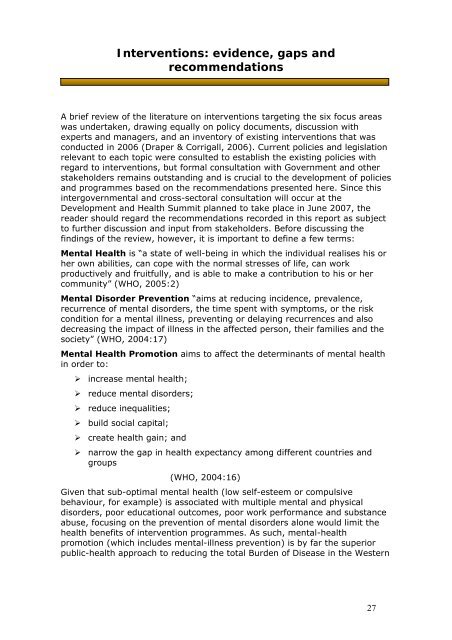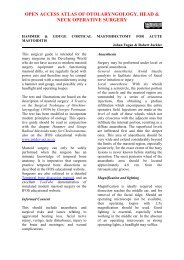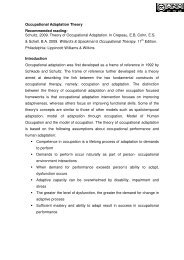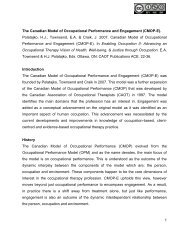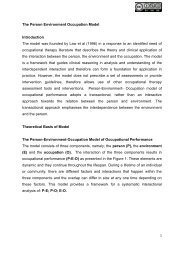- Page 1 and 2: Western Cape Burden of DiseaseReduc
- Page 3 and 4: AcknowledgementsAuthorsDr Joanne Co
- Page 5 and 6: illion a year. When the further cos
- Page 7 and 8: Table 2: Percentage contribution of
- Page 9 and 10: I Multiple Deprivation1. Improve ac
- Page 11 and 12: 11.Evaluate and support Non-Governm
- Page 13 and 14: interventions. More broadly, the su
- Page 15 and 16: Figure 2: An example of how interve
- Page 17 and 18: The aim of the Mental Health Workgr
- Page 19 and 20: Why mental health is necessary: the
- Page 21 and 22: Medical Research Council/ UNISA. (2
- Page 23 and 24: FindingsWhile the findings of the r
- Page 25 and 26: The literature review also identifi
- Page 27: Table 7: Selection criteria with re
- Page 31 and 32: On the other hand, the Provincial G
- Page 33 and 34: the quality of building materials,
- Page 35 and 36: Conclusion‣ The Western Cape can
- Page 37 and 38: association and the evidence on the
- Page 39 and 40: Figure 7: The relationship between
- Page 41 and 42: The Michigan Prevention Research Ce
- Page 43 and 44: y 11-34% (Ficano et al, 2006). This
- Page 45 and 46: through the stresses associated wit
- Page 47 and 48: ‣ an insufficient recognition of
- Page 49 and 50: ‣ Community buy-in and participat
- Page 51 and 52: understand the relationship between
- Page 53 and 54: ‣ Ensure ongoing training and sup
- Page 55 and 56: Evans, G.W., Wells, N.M., Moch, A.
- Page 57 and 58: Vic Health.(2007).www.health.vic.go
- Page 59 and 60: 1999; Stenius & Veysey, 2005) — a
- Page 61 and 62: Collaborating Centre for Mental Hea
- Page 63 and 64: Conclusion‣ Some types of early i
- Page 65 and 66: ‣ Self-awareness training should
- Page 67 and 68: ‣ Non-Governmental Organisations
- Page 69 and 70: g) Any disaster plans for the Weste
- Page 71 and 72: National Institute of Mental Health
- Page 73 and 74: The legal regulation of substances
- Page 75 and 76: ‣ Media campaigns are shown to be
- Page 77 and 78: 3.1. Social-influence model‣ Emph
- Page 79 and 80:
Conclusion‣ Reducing the availabi
- Page 81 and 82:
‣ Marital and family therapy has
- Page 83 and 84:
emphasis on broader environmental f
- Page 85 and 86:
Table 10: Governmental intervention
- Page 87 and 88:
D. RecommendationsThe recommendatio
- Page 89 and 90:
Ferri, M., L. Amato, et al. (2006).
- Page 91 and 92:
IV. MENTAL HEALTH SERVICES(return t
- Page 93 and 94:
Table 12: Categories of mental-heal
- Page 95 and 96:
opportunities and rewards for bully
- Page 97 and 98:
‣ Culturally appropriate interven
- Page 99 and 100:
Some health services in schools are
- Page 101 and 102:
2.1. Core features of workplace-bas
- Page 103 and 104:
2.3. Existing interventionsWhile th
- Page 105 and 106:
to be representative of the general
- Page 107 and 108:
• Trauma units and surgery casual
- Page 109 and 110:
Similar models may be generated for
- Page 111 and 112:
Table 15:. Estimated needs for ment
- Page 113 and 114:
D. Recommendations1. School-based m
- Page 115 and 116:
Invest in media campaigns that aim
- Page 117 and 118:
Browne, G., Gafni, A., Roberts, J.,
- Page 119 and 120:
McLoone, J., Hudson, J. L., & Rapee
- Page 121 and 122:
for Economic Sciences, economist Ja
- Page 123 and 124:
employment, which is protective aga
- Page 125 and 126:
turnover, positive and committed at
- Page 127 and 128:
only one quarter of the community-b
- Page 129 and 130:
Ou, S. & Reynolds, A.J. (2006). "Ea
- Page 131 and 132:
leisure significantly predicts posi
- Page 133 and 134:
Conclusion‣ There is evidence tha
- Page 135 and 136:
Petticrew, 2003). South (2004) repo
- Page 137 and 138:
4. Environmental factorsHealthy nei
- Page 139 and 140:
• Include non-competitive sports
- Page 141 and 142:
Table 17: Recreational activities t
- Page 143 and 144:
ReferencesArgyle, E., & Bolton, G.
- Page 145 and 146:
Marine, A., Ruotsalainen, J., Serra
- Page 147 and 148:
educing falls among elderly people:
- Page 149 and 150:
economic opportunities and assets.
- Page 151 and 152:
Table 19: The impact of recommended
- Page 153 and 154:
V. Implementationi. Integrating int
- Page 155 and 156:
programme is first implemented) wit
- Page 157 and 158:
Appendix 1Literature review of the
- Page 159 and 160:
Conclusion: There is strong evidenc
- Page 161 and 162:
achievements and successes in the s
- Page 163 and 164:
• The built environment influence
- Page 165 and 166:
Evidence from cross-sectional surve
- Page 167 and 168:
and substance abuse disorders among
- Page 169 and 170:
isk for physical ill-health, which
- Page 171 and 172:
Conclusion: The evidence demonstrat
- Page 173 and 174:
has shown that the most poor are un
- Page 175 and 176:
1.9. Transport Back to IndexNo arti
- Page 177 and 178:
nine provinces ranging from 0.20-0.
- Page 179 and 180:
(Bhugra, 2004). Furthermore, the li
- Page 181 and 182:
1.12. Spatial segregation Back to I
- Page 183 and 184:
conversely, substance abusers were
- Page 185 and 186:
Conclusion: The evidence for urban
- Page 187 and 188:
Again, the likelihood is that this
- Page 189 and 190:
this instance are (Kaliebe & Sondhe
- Page 191 and 192:
2.4. Race Back to IndexA review of
- Page 193 and 194:
females 3.8 times as likely to have
- Page 195 and 196:
teacher burnout (Hastings & Bham, 2
- Page 197 and 198:
2.7. Personal experience of abuse o
- Page 199 and 200:
A review of literature in the devel
- Page 201 and 202:
studies: one (Dalgard & Tambs, 1997
- Page 203 and 204:
Section 10. Human dignitySection 12
- Page 205 and 206:
punishment, which explains the effe
- Page 207 and 208:
health or social harm (a pattern co
- Page 209 and 210:
McKee, Karasz, & Weber (2004) descr
- Page 211 and 212:
abuse, HIV related stressors and Ai
- Page 213 and 214:
methodological problem of recall bi
- Page 215 and 216:
• Maternal substance using during
- Page 217 and 218:
childhood to adulthood. While these
- Page 219 and 220:
American Psychiatric Association (1
- Page 221 and 222:
Bursik, R. (1988). Social disorgani
- Page 223 and 224:
De Vries, M. W. & Wilkerson, B. (20
- Page 225 and 226:
Funk, M., Saraceno, B., Drew, N., L
- Page 227 and 228:
Jin, R., Shah, C., & Svoboda, T. (1
- Page 229 and 230:
Leatt, A., Rosa, S., & Hall, K. (20
- Page 231 and 232:
Mulvihill, D. (2005). The health im
- Page 233 and 234:
Patel, V. & Kleinman, A. (2003). Po
- Page 235 and 236:
Rosenheck, R., Dausey, D., Frisman,
- Page 237 and 238:
Stukas, A., Dew, M., Switzer, G., D
- Page 239 and 240:
Whitaker, R., Phillips, S., & Orzol


